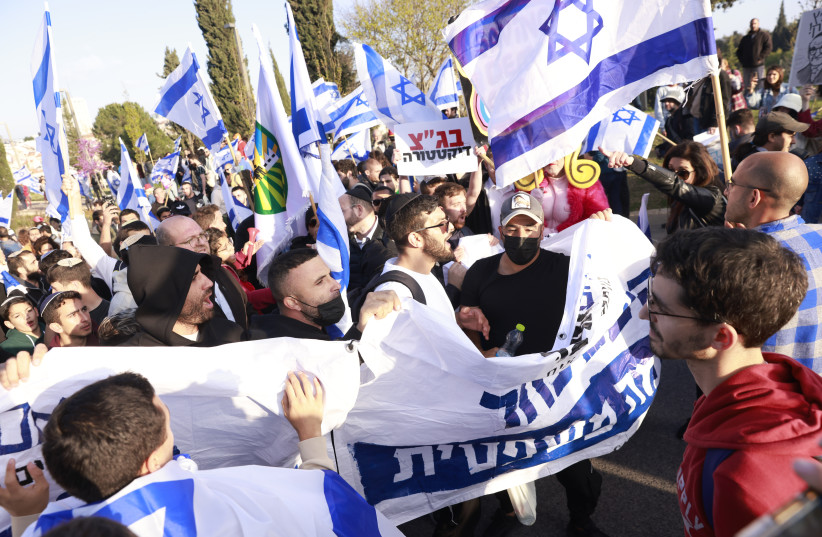One of the most remarkable and positive features of the post-Simchat Torah Massacre landscape in Israel is the almost total unity of the people behind the war effort and war aims of destroying Hamas.
Indeed, a poll taken a couple of weeks into the war showed an amazing 94% support for the war among Jewish Israelis.
Of course, the remaining 6% are accounted for, on the one hand, by the bleeding-heart, hard-core liberal left whose entire raison d’etre is to be as critical and vocal as possible of every action Israel ever takes, and at the other end of the spectrum, the equally malign (but probably marginally less dangerous) so-called ultra-Orthodox fanatical Israel haters of Neturei Karta. This latter group is so far beyond the pale that even the Satmar hassidic community, certainly not renowned for its love or support for the State of Israel, has thrown them out.
However, I would hazard a guess that the same poll today would not yield such unified results.
The cracks in the unity are beginning to appear.

The five stages of grief
I am reminded of the now famous five-stage model used to explain reactions to change and loss, first described in 1969 by the Swiss-American psychologist Elisabeth Kubler-Ross as a model for understanding the different stages of dealing with grief.
Kubler-Ross details the five stages of reaction: denial, anger, bargaining, depression, and acceptance.
What is fascinating and pertinent to any cataclysmic event, is that while almost everyone goes through these phases in their reaction, different people go through them at different paces and often oscillate back and forth.
Practically the entire country entered the phase of denial as soon as the news filtered through on that horrible Simchat Torah morning. None of us could believe it – surely this was a hoax? The shock we felt was part of this denial process.
As the realization dawned that this was not a bad dream but a nightmarish reality, we became angry, very angry indeed – with whoever was there to be angry at, Hamas, the Government, the army, the world.
Many of us are still stuck in that phase of anger, while some have passed into the darker place of depression, wondering whether our lives will ever be the same again.
Even those who are deeply entrenched in the anger phase will have moments of depression, flashes of bargaining with God (I promise to be a better person; just bring back our people/soldiers safely), and those whose daily dread of the 24-hour non-stop bombardment of news has led them to a dark place of depression, will feel the rise of anger and the desire to scream at the world to look at and appreciate our pain.
Very few of us have yet reached the comfort of the acceptance phase and it seems a long way off for most of us
The difficulty with the uneven pace of individual reaction to the most traumatic event in the history of the modern State of Israel, is that we are in danger of, once again, failing to validate other people’s feelings and viewpoints.
We are all acutely aware of the awful divisiveness of pre-October 7 Israel with demonstrations, counter-demonstrations, families not speaking to one another, and a general feeling of a nation torn apart.
Well, it is beginning to surface again, only this time, we are all hurting, grieving, and reacting in our own ways and at our own pace – and that makes it very difficult to rationally assess the situation.
There are those who, absolutely understandably, demand, as a matter of moral imperative, that our hostages be brought home now, whatever it takes.
There are those who argue with a profound and foreboding sense of déjà vu that swapping hostages for imprisoned terrorists is compounding the problem and we are only in this situation now because of the “mistake” of the Gilad Schalit deal.
These two opposing viewpoints each have compelling virtues and angry, depressed, and desperate proponents.
It is the Judgement of Solomon as there is no 100% right or 100% wrong answer. Once again we are talking shades of grey.
The proposal of instituting the death penalty for those convicted of taking part in the massacres is another potential minefield of vehement disagreement.
Jews have views; it is inevitable. Angry and hurting Jews have even stronger views.
There are those who argue that the reason our enemies were able to so successfully attack us was because of our disunity – the fact that Israeli brother did not love and respect Israeli brother.
There is a real danger that what has united us in grief and enabled a strong response with full support up till now, will dissipate on the altar of genuinely heartfelt opinions that lack the peace of mind to stop and try to understand, if not to agree with, the opposite viewpoint.
We must not let this happen. We must learn the lesson of the last 12-18 months. As I saw written on a bridge over the highway at the height of the judicial reform divisions, “To discuss is permitted – to hate is forbidden”.
We must try to put our anger, our depression, our emotions on hold when we express our opinions.
The language used has to be tempered and moderate, even if the feelings are strong and raw.
Let’s work at understanding that there is always more than one way of viewing a problem. These are really tough decisions and no one making them is trying to harm our People.
We must attempt to look at our brothers’ and sisters’ opposing views on these incredibly difficult issues through the lens of a sibling – not an enemy. We have plenty of those from without, we cannot afford any more from within.
Our unity is our strongest weapon – we dare not let the cracks open up again.
The writer, a rabbi, lives in Ramat Poleg, Netanya, and is a co-founder of Techelet – Inspiring Judaism.
